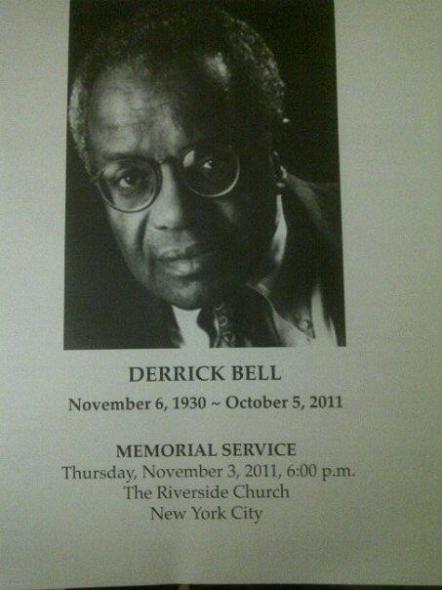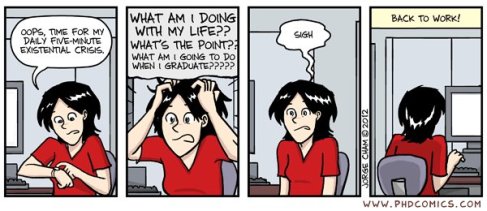“Why are you interested in this topic for your dissertation?”
*Sits in front of the computer – for hours.*

Courtesy of http://www.floota.com/desk_jockey.htm
It’s my birthday and another year goes by — not just me getting older but also diving deeper and deeper into my dissertation topic. Last year, I completed a year of emotional cleansing and clearing out the negative influences in my life. And, although one can never completely get rid of this negative stuff (like bacteria) I am learning to live with them and even use them to help me think through my values as a Race–Worker and a race analyst. I am in the process of doing this and probably why I am stuck on the question above and others such as:
Why are you doing what you are doing right now? What brought you to this point? Why do you want to continue on this path?
This is the year to ask “Why?”
*Still sitting in front of the computer. Crying my eyes out.*
So I go back to the end of my second certification exam and the beginning of seriously thinking about a dissertation topic. To help with these memories, I read again a post from my friend Tara Conley who is beginning her search for a topic.
I remember those days. Nothing feels right. But you want to do EVERYTHING. Everything seems so dang interesting. You’re scared that you may pick the wrong topic. Like going on a long journey and realizing that you took the wrong train. I thought then that a literature review could be done in a summer. I pressured myself into finding a topic and getting it done. There is pressure because you really do believe it can be finished in a summer. But at the institution that both Tara and I attend, this is highly unlikely. The thought-process to arrive at a topic is a long and arduous one that is exhausting and deserving of a badge of honor – a thinking one that is. No other process will allow you the opportunity to value “thinking” in the reading, writing, and researching process. One idea follows another like watching one slow moving train after another. And you are just sitting there waiting for the right one to jump on.
Until the day came when it hit me – that big idea that has been afflicting me my whole life:
Why are people so racist? And what are we doing about it?
That’s the train!!! Music you listened to, movies you chose to watch, books lined up like soldiers in your personal library as if ready for battle when you are ready to say “FIRE!” all of a sudden begin to make sense.
YES! I found it! That’s the train I want to jump in and the path I want to go on. Of course! But it’s a train ride. We forget that this journey has multiple stops and can be a long one.
The bright side: We are no longer sitting in the station waiting to get on the train. We may now be on that train, but we are still sitting. Going along for the ride. Because although we think we chose the topic, in reality, the idea chose us. We are going along this IDEA’s journey. We haven’t mastered learning how to operate the train.
Yet.
Oh, those days seemed bright…
The topic, like the train journey, obviously is very broad, but as you review the literature you start noticing patterns, like the ads inside the train and the occasional graffiti outside of the train, or the people who come in to stay or leave. Those patterns become natural to you and if you just stay long enough they push you along. Noticing these patterns are key to honing down your research agenda. And guess what? You haven’t even begun to write.
You begin to realize that you will write multiple literature reviews, edit multiple versions, find new literature to include.
Think, review, write. Think, review, write. Version #127
You have your big idea. Then you marry that with what is missing. Ideas start to swirl. Like a baby first learning how to talk, you start verbalizing those ideas. Sounds crazy at first. Like when you ask a passenger for directions to a particular location but you aren’t quite sure where you are going either. Those people, the nice ones, sit there patiently looking at you as you start talking, you take back what you said, then start again on your BIG idea.
“That’s too big.”
‘You need to read some more”
“Are you sure you want to do that?”
Sigh.
Then you wonder: Why am I doing this again? Why am I on this dang train, again?
I continue to write. But as I continue to write and ride this train, I started losing touch with why I am interested in my topic in the first place. The Race-Worker forgot? I have a whole blog about this! My friends thought I was crazy when I told them. “But that’s all you talk about!” they exclaim.
So the next step, for me, is to look to my heroes and talk to the other passengers on this train. We may be going the same way, I think. They may be able to help remind me of why I wanted to get on this train in the first place.
In this case, one of those passengers is Derrick Bell. Derrick Bell is the ultimate Race-Worker. He responded to the lack of faculty of color at Harvard University by giving up his own position. His TENURED position! At Harvard! Who responds that way to institutional racism?
Derrick Bell did.
His response to racism was one of the reasons why I was inspired to delve into my dissertation topic. I research responses to racism particularly by colleges and universities. I wonder about the ways we choose to respond to racist incidents. How do we confront racism? How do we teach others to do so? I wanted to talk with him about this and other things.
Unfortunately, my hero died on October 5, 2011. Having never had the guts to meet him personally, I thought I could at least attend his memorial in New York City. 
At his memorial, Professor Derrick Bell was remembered as the “last of the race men”, “climate changer”, “a hero for choosing principle over prestige”, “teacher”, “father”, “confessor”, “mentor”. He was best known as someone who “always brought blankets” for student protesters, someone who believed in “radical inclusivity” and a man who’s alter ego was a woman named Geneva Crenshaw.
His teaching was described as “student centered” – someone who always put every single one of his students at the heart of his classes, someone inspired by Dewey and Freire, who taught classes up until the last week before he passed away. His students denounced anyone who called him a pessimist, explaining that his insistence on the persistence of racism actually provided him with the kind of humanity that allowed him to never run away from a struggle. He was described as a man who deeply loved his students and enjoyed karaoke.
His students one by one began speaking with strength but ended up tearing, some crying, almost as if the realization that he was no longer physically with them really hit home. Many of them said “I do what I do because of Derrick Bell”; “I am a law professor because of Derrick Bell”; “I study and think about race because of Derrick Bell.”
In the end, he taught others how to be Race-Workers, too. The ultimate response to racism.
His courage, along with others, made me seek that ingredient, that antidote to racism and inject that to our colleges and universities. I want to help in the fight against racism by figuring out who is doing this well – and perhaps helping colleges and universities with these lessons. The stories I heard at Professor Bell’s memorial made me wonder, in the hustle of writing and producing and conferencing and all that other jazz, how are future scholars, future administrators being taught to fight against racism, to develop anti-racist values?
I am still on this train ride – the train ride a Race-Worker jumps on hoping to find ways to confront racism every day. One of those ways is hopefully through this dissertation. And, while everyone talks about the good dissertation being the “finished” one – which I completely agree with – as a Race-Worker and Race Analyst my values are linked to this dissertation. I was never told that fighting racism was easy – that it would be one of the most difficult fights that I would take on – but I guess I and Race-Workers before me wouldn’t have it any other way.
I think I remember why I jumped on this train.


